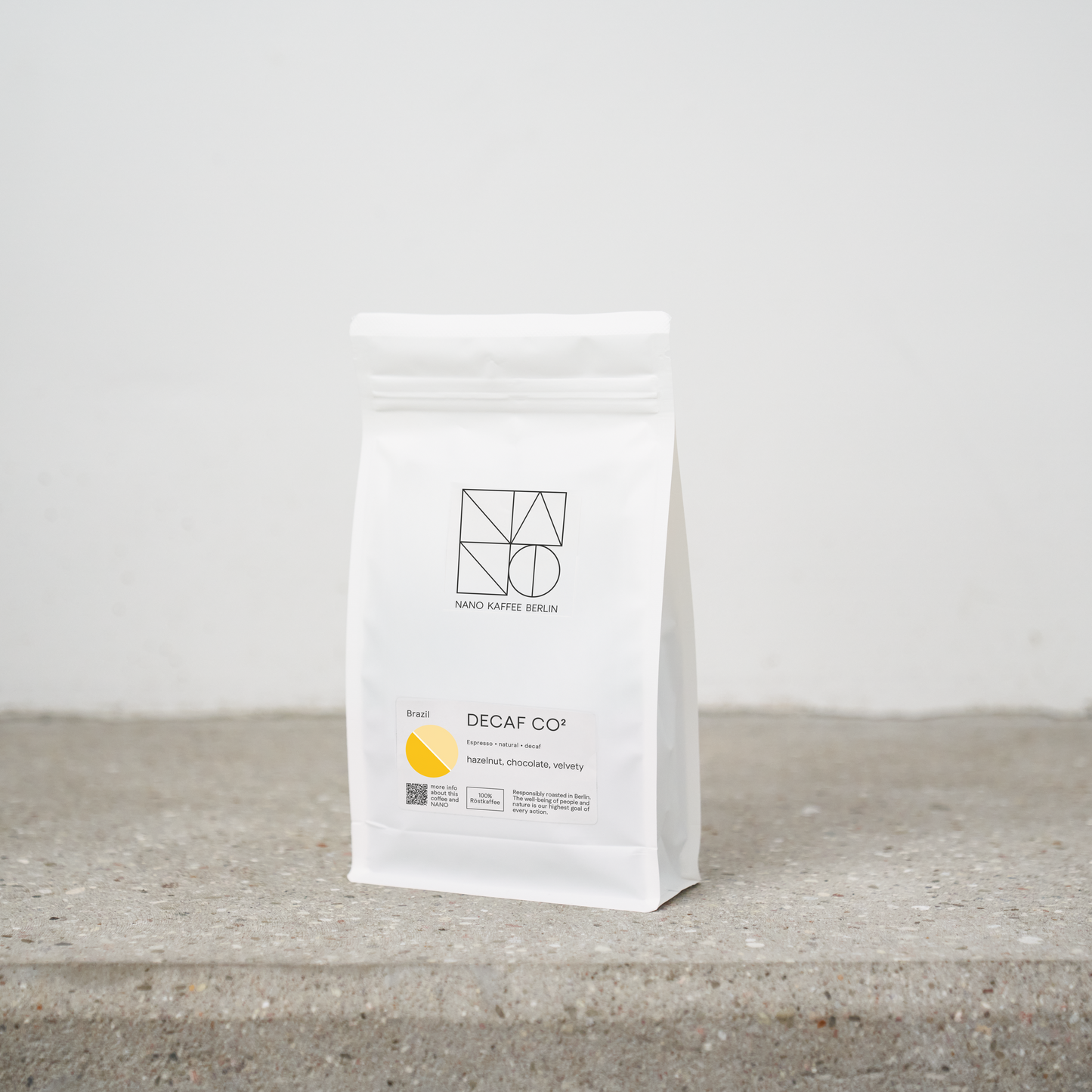Brazil | DECAF CO₂
Brazil | DECAF CO₂
Couldn't load pickup availability
This espresso roast also works beautifully as a bold and sweet filter coffee.
You will find flavors hazelnut and chocolate, rounded out by a velvety mouthfeel.
100 % Arabica
whole beans
This coffee is a product of the highest quality, cultivated and roasted in respectful interaction between man and nature - that's what NANO KAFFEE stands for.
Stats
ORIGIN: Brazil
REGION: Minas Gerais
ALTITUDE: 900-1,250 masl
FARM/GROWER: various
IMPORTER: InterAmerican Coffee
VARIETY: Mundo Novo, Catuaí, Bourbon
PROCESSING: natural
DECAF METHOD: CO²
FLAVOUR: hazelnut, chocolate, velvety
Quick info
This naturally processed coffee comes from the mineral-rich coffee regionsof Minas Gerais. Stable climate conditions and slow maturation give it the smooth and typical character of a Brazilian Santos. A gentle, organic-certified decaffeination process preserves its full aroma. With pronounced sweetness, balanced acidity, and notes of hazelnut and chocolate, each cup reflects the essence of Minas Gerais — smooth, well-rounded, and unmistakably Brazilian, just without the caffeine.
Farmers
More than 70% of coffee farms in the renowned Minas Gerais region of southeastern Brazil are small-scale, run by local farmers who cultivate their coffee with care and traditional methods. The labor-intensive handpicking of cherries at optimal ripeness enhances quality, contributes to an exceptional cup profile and ensures the plants remain healthy.
The cherries are processed using the natural (dry) method, where the coffee dries inside the fruit. This water-efficient process enhances the coffee’s sweet and fruity notes, as the beans absorb natural sugars from the surrounding pulp over time.
The region’s reliable dry and rainy seasons (it rains reliably from December to March) allow farmers to focus on process and quality without production being disrupted by unpredictable weather.
Locals from Minas Gerais are also known as Mineiros.
Nature
Thanks to its ideal geographic location, predominantly temperate climate and a coffee tradition dating back to the early 18th century, Brazil has become one of the world’s leading coffee producers. Around 30% of the global coffee harvest comes from the nutrient-rich, mineral-laden soils of South America’s largest country — nearly one in four coffee plants grows here.
Farms located within the coffee belt benefit from tropical to subtropical conditions, typically producing smooth, mild and delicately spiced coffees.
Minas Gerais first gained recognition for its rich mineral deposits, but today, it is one of the largest coffee-growing regions in the world.
The key to its coffee’s exceptional quality lies in the consistent ripening process of the cherries. Moderate temperatures, well-defined dry and rainy seasons and elevations between 900 and 1,250 meters provide optimal conditions for slow and even maturation. This extended development allows the cherries to absorb more nutrients from the plant, resulting in complex flavors, pronounced sweetness, balanced acidity and a velvety texture — a terroir that produces some of the most exquisite and flavorful coffees in the world.
Impact
Natural processed coffee is particularly resource-efficient, as the beans are sun-dried, requiring minimal water for processing — a sustainable method that significantly reduces its environmental footprint. This traditional approach also allows small-scale farms to produce high-quality coffee in an eco-friendly manner without the need for expensive infrastructure or large-scale water treatment facilities, supporting their economic independence while preserving the local environment.
The importing company behind this coffee is actively involved in sustainability initiatives and corporate responsibility efforts, advocating for environmental and social standards throughout its supply chains. This includes ethical sourcing, responsible harvesting, logistics, distribution and meticulous quality control.
Such initiatives are crucial, highlighting the complex challenges and ongoing efforts in corporate responsibility and human rights that global coffee supply chains must navigate — especially in collaboration with Brazil, the world’s largest coffee exporter.
The organic-certified decaffeination process is based on liquid carbon dioxide and follows a gentle, extended cycle through multiple repetitions. This method is not only kind to the bean but also to the climate. Compared to conventional processes, it has a low water consumption rate and eliminates the risk of water contamination, making it an environmentally responsible choice.
Decaf CO²
Caffeine is just one of many components in coffee.
The Carbonic Natural™ process gently extracts only the caffeine, preserving the full flavor potential of the green coffee. No valuable compounds are lost, which will later develop into the coffee’s distinctive aromas during roasting.
This is only possible through time, expertise and a deep understanding of specialty coffee. The process takes ten times longer than conventional decaffeination methods, ensuring a result that respects the integrity of the bean.
This unique decaffeination method uses natural carbon dioxide from the Volcanic Eifel region in Germany. The green coffee is moistened with warm water and steam at 25°C, causing the beans to expand and open their structure. Under a pressure of approximately 70 bar, the liquid carbon dioxide extracts the caffeine without affecting the other compounds. This cycle is repeated multiple times until the caffeine is almost entirely removed.
With growing demand for natural, sustainable coffee consumption, this process offers an organic-certified, exceptionally gentle caffeine extraction, leaving everything else intact. Carbonic Natural™ sets the premium standard for specialty coffee decaffeination.
The taste
Santos is a common market term for high-quality coffee from Brazil, typically shipped through the port of Santos and often grown in the southern part of Minas Gerais.
While Bourbon Santos is a well-known reference, our Brazil Santos is actually a blend of three closely related varieties: Mundo Novo, Catuaí and Bourbon. These varieties capture the signature qualities of Minas Gerais while adding a subtle fruity nuance. The gentle decaffeination process ensures that no aromas are lost.
The result is a harmonious cup, where rich sweetness balances bright acidity, complemented by chocolate notes and the nutty essence of hazelnut. A smooth, velvety mouthfeel rounds it off — a true Brazilian Santos, just without the caffeine.
—
This coffee is a product of the highest quality, cultivated and roasted in respectful interaction between humans and nature - that is what NANO KAFFEE stands for.
For organic certification: DE-ÖKO-070
Share




